- India EV Market
- Electric Two-Wheelers
- Electric Three-Wheelers
- EV Policy & Incentives
- Battery & Charging Infrastructure
- Sustainable Mobility
- EV Export Hub
- EV Industry Leaders
- Clean Energy Transition
- Future of Mobility
EV Market In India At Inflection Point; Growth Imminent Across Categories
- By Gaurav Nandi and Nilesh Wadhwa
- September 09, 2025
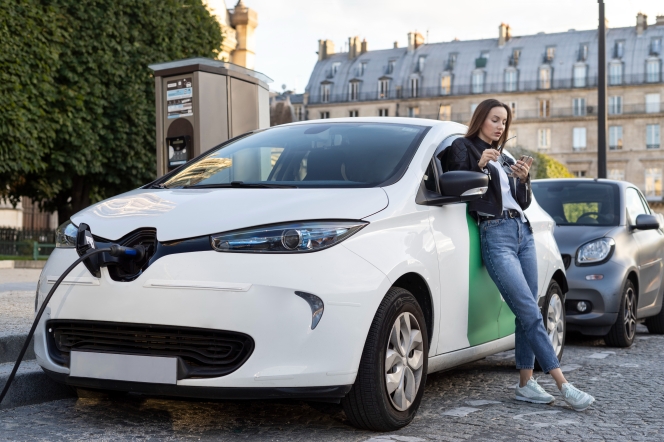
EV Market In India At Inflection Point; Growth Imminent Across Categories
The third largest automobile market saw a staggering 2,142,565 units of electric vehicles sold between September 2024 and August 2025, according to data from Vahan Dashboard (excluding Telangana).
The electric vehicle sales in India witnessed mixed sales in August, 2025, according to the same source. Statistics put electric two-wheeler sales at the lead with 104,373 units compared to July’s 103,469 units, followed by four wheelers at 17,387 units from 16,127 units a month earlier and the rest of the pie was goods carriers, buses and three-wheeler cargo carriers.
The dashboard also reported a decline in electric rickshaw sales that dell to 36,962 from 39,782 in July, followed by electric three-wheeler L5 passenger (18,007 from 20,446) and electric carts (6,213 from 6,817).
Nonetheless, the market sentiment about this vehicular segment seems to be strong. Exuding confidence on World EV Day 2025, Deepak Manwani, Head of Operations and Revenue at Yuma Energy, told Motoring Trends, “As India’s automotive sector accelerates towards electrification, the momentum is unmistakable in two- and three-wheelers. What began with fleet use cases is now rapidly entering personal mobility with adoption climbing year-on-year.”
He noted that supportive government policies such as FAME II, the newly launched PM e-DRIVE scheme and state-level EV mandates for EV adoption as well as for charging and swapping infrastructure creation are creating a strong policy tailwind.
There is also an influx of customised financing options for EVs, which is providing further impetus to the two-wheeler and three-wheeler segments. Industry projections indicate that by 2030, nearly 35–40 percent of new two-wheelers and over 50 percent of three-wheelers could be electric with more ambitious scenarios targeting up to 80 percent penetration in these categories.
Sharing the same confidence, Som Kapoor, Partner at EY India, noted, “EVs currently make up about five percent of the market and we’re at an inflection point. Growth is inevitable and the consistent share across different vehicle sizes signals strong policy support from the government. EV adoption will continue to expand as part of the overall auto market.”
He shared that post-pandemic, the Indian automobile market has witnessed stabilised growth at around 3–4 percent, rather than in double digits. With the upcoming GST changes, a boost in small cars and overall volume is expected, especially in the second half of this year.
“In terms of EVs, the two-wheelers segment, which already has a growing momentum, will continue in the path. We expect strong growth in segments where vehicles work on closed routes or where assets are monetised daily, such as three-wheelers and commercial vehicles. These areas will see tremendous adoption,” added Kapoor.
Market command
Despite a modest share in the entire automobile market currently, EVs are expected to gobble at least one-third of the pie. Alluding to this, Manwani noted, “By the end of this decade, we expect electric vehicles to command nearly a third of India’s automotive market with two and three-wheelers at the forefront of this shift. Projections indicate that up to 70–80 percent of new scooters, motorcycles and electric-rickshaws could be electric by 2030, while passenger cars and buses steadily build towards 20–25 percent adoption.”
At the global level, where there are outliers like China and the Nordics leading the EV penetration, India is broadly in line with other major markets and the adoption levels are comparable to its global peers, noted Kapoor.
Furthermore, the torch bearer for EV adoption till the end of the decade is expected to be two-wheelers and three-wheelers. “These are the vehicles that define our cities – scooters weaving through traffic, delivery bikes bringing food to our doors and rickshaws ferrying millions on their daily commutes,” said Manwani.
He added, “They are the lifeblood of urban mobility, and because they run hard and run often, they are also the first to embrace the undeniable economics of going electric. Cars, meanwhile, will follow steadily, starting with city users and early adopters who see EVs as both aspirational and practical for daily city commutes. And then there are our commercial fleets, buses connecting cities, trucks and vans moving goods across states, slowly but surely shifting to electric because the savings are too big to ignore.”
Another boon for the indigenous industry will be collaborations, according to Kapoor. “As Chinese collaboration opens up, we expect to see technology transfers and joint ventures that can accelerate India’s EV ecosystem. These partnerships will be valuable for scaling both manufacturing and innovation,” he contended.
Drawing on the same lines, Omega Seiki Mobility Chairman Uday Narang noted, “Over the past year, India’s EV sector has moved from experimentation to consolidation with stronger players and sustainable models emerging. EV three-wheelers, both passenger and cargo, along with new-age electric trucks, especially in the 1–1.5 tonne category will be the real growth drivers of this market.”
Commenting on current market domination of EVs, Kazam Chief Executive Officer Akshay Shekhar opined, “India's EV narrative is transitioning from initial curiosity to industrial scale. It is not only from the vehicles but also from charging infrastructure and software orchestration. In the next five years, we anticipate chargers to be as pervasive as fuel pumps for three- and two-wheelers with charging equipment closely integrated into fleet operations, home installations and e-commerce logistics.”
Supply and power
Volks Energie Chief Executive Officer Piyush Goyal opined that the world is moving towards largescale adoption of clean mobility and sustainable energy and that companies in India are feeling that effect.
“What started as a symbolic initiative five years ago, has turned into a global movement today as the world collectively and rapidly moves towards large-scale adoption of clean mobility and sustainable energy. This adoption reflects not only a technological change and preference but also a shift in the societal expectations from the automotive and renewable industries overall. Consumers today demand cleaner and more resilient energy systems,” he stated.
Moreover, the Central Government’s ambitious plans to make the country an export hub can well be extended to electric vehicles. Alluding to the strategy, Kapoor stated, “Our immediate priority should be strengthening the local market. That said, companies like Maruti are already exporting EV models before bringing them to Indian customers. India has the technological capability and manufacturing infrastructure to grow as an export hub over time. Steady progress will be key.”
While he noted that currently the three main challenges for higher penetration are charging infrastructure, consumer mindset shift towards EVs and high upfront cost of ownership, private charging access is seen as a crucial.
“In India, many homes lack dedicated parking slots, making at-home charging challenging. Until that improves, public charging needs significant expansion. Both private and public infrastructure must evolve to support mass adoption,” noted Kapoor.
Another barrier pointed out was the reliance on imported components. According to Manwani, “India is heavily reliant on imported components for its EVs, especially batteries and advanced electronics, which makes India vulnerable to any kind of supply shocks due to changing geo-political scenarios. The current geo-political uncertainties have caused production disruptions in the last six months. And to overcome this, India needs to have a long-term plan to become self-reliant on cell manufacturing, rare earth magnet production as well as cultivating alternative sources of lithium and other metals essential for sustaining India’s EV ecosystem.”
Motwani also added that cell prices have dropped by as much as 40–50 percent in the last 24 months and this has certainly helped spur new demand in India. This has also meant larger battery packs in vehicles, thereby helping reduce range anxiety and making EVs a viable option in a market where charging infrastructure is still catching up.
For swapping players, this has been a boon as reducing cell and battery price means faster asset deployment due to lower capex spend. This has helped drive large scale transformation in commercial mobility in line with the policy push from various quarters.
Kapoor also noted a need to change the direction of incentives. “So far, incentives have largely supported the supply side. We now need demand-side incentives, which are direct benefits to consumers that make EV adoption more attractive,” he said.
Alluding to the growing demand for EVs, Trontek Chief Executive Officer Samrath Singh Kocchar opined, “India's EV ramp-up is being driven by affordable battery prices, policy incentive and fast two-wheeler electrification but true long-term play will be in battery technology, circularity and systems thinking. Over the next five years, we expect major strides in energy density and fast-charging with battery-swapping and modular solutions gaining momentum in fleet operations.”
- Eicher Trucks and Buses
- VE Commercial Vehicles
- VECV
- India Book of Records
- IBR
- Eicher Pro X
- Vinod Aggarwal
- SS Gill
- Abhishek Chaudhary
Eicher Pro X EV Completes Kashmir To Kanyakumari Journey In 6 Days
- By MT Bureau
- January 28, 2026
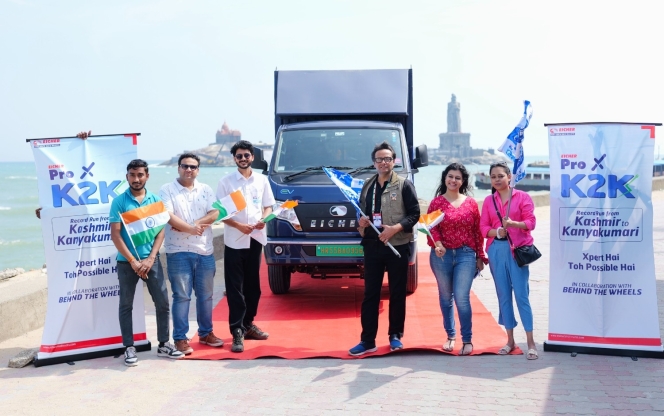
Eicher Trucks and Buses, part of VE Commercial Vehicles (VECV), has completed a journey from Kashmir to Kanyakumari using its Eicher Pro X EV.
The record verified by the India Book of Records (IBR), saw the electric vehicle cover over 4,000 kilometres in 6 days under loaded conditions. The run commenced in Srinagar on 20 January 2026 and concluded in Kanyakumari on 26 January 2026, traversing the Himalayas, plains and the Deccan Plateau.
Throughout the expedition, the vehicle utilised public chargers located via the MyEicher App. An adjudicator from the India Book of Records accompanied the truck to monitor route compliance, load, distance and charging stops. The mission served as a demonstration of electric vehicle endurance across diverse altitudes and climates to validate the technology for logistics corridors.
The journey was intended to show that electric commercial vehicles can operate beyond short-haul deliveries. By maintaining performance across hilly and coastal routes, the Pro X EV aimed to establish total cost of ownership (TCO) benefits and maintenance predictability for fleet operators. The successful completion of the route suggests that current charging infrastructure can support long-haul electric freight movement.
Vinod Aggarwal, MD & CEO, VE Commercial Vehicles, said, “For more than four decades, Eicher trucks and Buses have earned customer trust through leadership in fuel efficiency and application-specific engineering. The record-setting performance of the Eicher Pro X reinforces our unwavering focus on application excellence, reliability, and performance, anchored in robust product development and manufacturing capabilities, and enabled by a customer-centric, pan-India commercial and dealer network. I commend the entire Eicher team for achieving these well-deserved records”.
SS Gill, Chief Commercial Officer, VE Commercial Vehicles, said, “By covering the K2K route with a loaded Pro X EV, Eicher Trucks & Buses has proven that electric mobility is no longer restricted to short-haul, ‘last-mile’ deliveries. We are not just setting records, but through the strength of our service network and extensive dealer set-up, we are demonstrating that our EV technology is commercially viable, reliable, and has the range to serve as the backbone of India’s green logistics corridors”.
Abhishek Chaudhary, SVP – SCV Sales & Marketing, VE Commercial Vehicles, said, “The Eicher Pro X EV was put to the ultimate test – covering over 4000 kilometres across diverse climates and challenging altitudes. With this recognition from the India Book of Records we’ve moved beyond our own stringent testing benchmarks to real-world validation - Demonstrating that Eicher Pro X EV is a dependable partner for logistics movement across varied operations in India”.
- Montra Electric
- Murugappa Group
- PM E-Drive Scheme
- Rhino 5538 EV 6x4 Tractor trailer
- Narendra Modi
- H D Kumaraswamy
- Arun Murguappan
- Sathia Raj
- UltraTech Cement
Montra Electric Becomes First OEM To Receive PM E-Drive Certification For Heavy Trucks
- By MT Bureau
- January 28, 2026
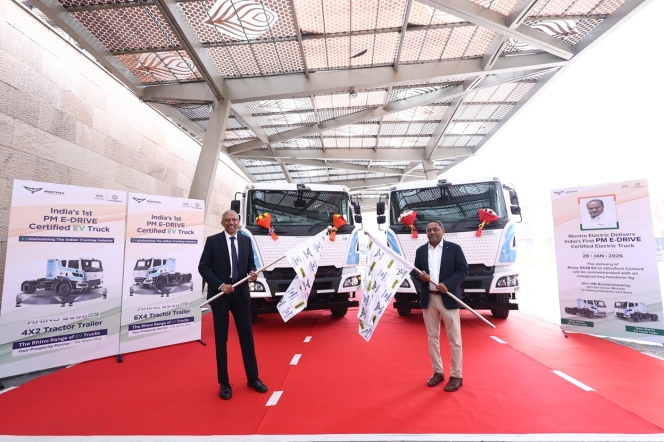
Montra Electric, the electric medium and heavy commercial vehicle business of the Murugappa Group, has become the first manufacturer in India to receive certification for heavy-duty electric trucks under the government's PM E-Drive Scheme.
To mark the achievement, the company delivered a Rhino 5538 EV 6x4 Tractor trailer to UltraTech Cement. The handover took place in the presence of Arun Murugappan, Chairman of Montra Electric and Sathia Raj, Chief Procurement Officer of UltraTech Cement.
The PM E-Drive scheme includes a budget of INR 5 billion specifically for electric trucks, providing a benefit of up to INR 960,000 per vehicle for the Rhino 5538 EV. This incentive is intended to lower operating costs and reduce exposure to fuel price volatility for fleet operators in the logistics, mining, and manufacturing sectors. The Rhino 5538 EV range is designed for Indian conditions and is available in 6x4 and 4x2 variants.
The Rhino 5538 EV 4x2 variant features a 282 kWh LFP battery that produces 380 HP and 2000 Nm of torque. It offers a range of approximately 198 km under standard test conditions and supports six-minute battery swaps. These specifications suit the vehicle for high-utilisation applications in ports, steel plants, and cement logistics.
H D Kumaraswamy, Union Minister for Heavy Industries, said, "The PM E-Drive scheme is a testament to the growing prowess of Indian innovation in the heavy-duty electric vehicle segment. Under the visionary leadership of Prime Minister Narendra Modi, we are committed to decarbonizing our logistics and making India a global hub for EV manufacturing. Electric trucks are pivotal to our Net Zero goals, and by fostering a self-reliant ecosystem through such certifications, we are driving the spirit of Atmanirbhar Viksit Bharat. We are very happy to see our Prime Minister’s vision coming to life with the 1st PM E-Drive certified heavy duty electric truck from 'Montra Electric' getting delivered today."
Arun Murugappan, Chairman, Montra Electric, said: “Decarbonising freight is one of the most critical challenges in India’s energy transition. We are grateful to the Government of India and our Prime Minister Narendra Modi for introducing forward-looking and progressive policy frameworks such as the PM E-Drive Scheme, which represent a welcome and transformative step in accelerating this shift, particularly in heavy commercial vehicles where emissions intensity is high. At Montra Electric, we are proud to contribute to this national mission by delivering technologically advanced, reliable, and scalable electric M&HCV solutions that can drive meaningful and lasting change in India’s mobility ecosystem.”
- Chartered Speed
- EKA Mobility
- PM E-Drive Scheme
- Bengaluru Metropolitan Transport Corporation
- Sanyam Gandhi
- Rohit Srivastava
- electric bus
Chartered Speed And EKA Mobility To Deploy 1,750 Electric Buses In Bengaluru
- By MT Bureau
- January 28, 2026
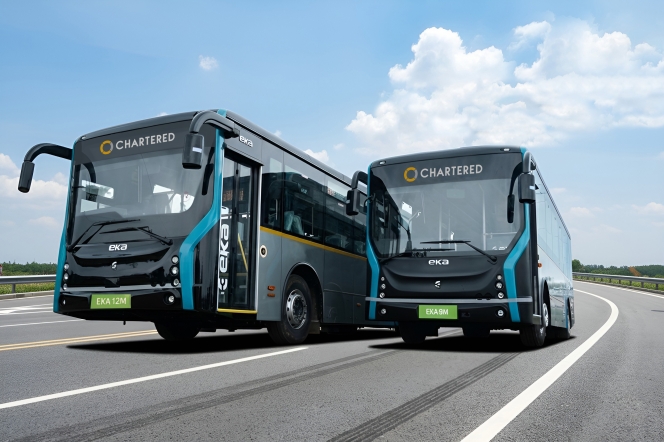
Chartered Speed and EKA Mobility have received a Letter of Confirmation of Quantity (LOCQ) to deploy 1,750 electric buses in Bengaluru under the PM E-Drive Scheme. This allocation accounts for approximately 39 percent of the city's total planned induction of 4,500 electric buses. The initiative is part of the Bengaluru Metropolitan Transport Corporation effort to expand its network in line with the decarbonisation roadmap of the Government of India.
The partnership combines the operational services of Chartered Speed with the vehicle manufacturing and technology of EKA Mobility. Operational protocols for the fleet include maintenance, battery monitoring, and driver training. Chartered Speed has stated its intention to transition 25 percent of its total fleet to electric power by Fiscal 2027.
The deployment aims to support public transport infrastructure in the region through investments in charging and maintenance facilities. Bengaluru is currently expanding its electric transport capacity to meet state mobility targets. The project focuses on providing urban transport solutions for the city's commuter base while reducing the carbon footprint of the public system.
Sanyam Gandhi, Whole-Time Director, Chartered Speed, said, “Bengaluru is a key mobility hub in India, and electric buses are part of the efforts to build a cleaner and more efficient public transport system. The PM E-Drive allocation strengthens Chartered Speed Limited’s long-term commitment to sustainable mass mobility. As one of the early adopters of e-mobility, we aim to convert around 25% of our fleet to electric by Fiscal 2027, supported by strong infrastructure investments to deliver commuter-centric services aimed at lasting socio-economic impact.”
Rohit Srivastava, Business Head & Chief Growth Officer, EKA Mobility, added, “The PM E-Drive initiative is a powerful enabler of India’s electric mobility vision, and Bengaluru’s large-scale adoption of electric buses sets a strong benchmark for urban transport transformation. At EKA Mobility, we are proud to partner with Chartered Speed and contribute to Bengaluru’s journey towards a more sustainable urban future. It is not just about scale, but about creating cleaner mobility solutions, quieter streets, and a better daily commute for millions.”
Suzuki Opens Second Biogas Plant In Gujarat
- By MT Bureau
- January 20, 2026
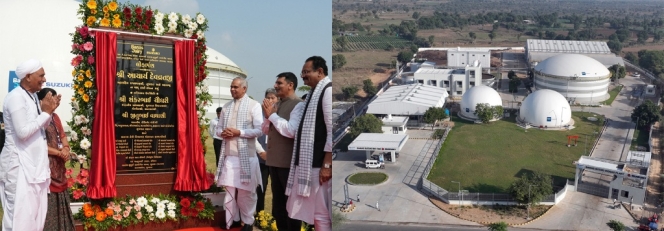
Suzuki Motor Corporation and its subsidiary, Suzuki R&D Centre India (SRDI), have inaugurated the Banas Suzuki Biogas Plant in Bhukhala, Gujarat. The facility, which opened on 18 January 2026, is the second such plant following the Agthala site that commenced operations in December 2025.
The plant is designed to process up to 100 tonnes of cow dung per day to produce approximately 1.5 tonnes of biogas. This output is equivalent to the daily fuel requirements of 850 compressed natural gas (CNG) vehicles. In addition to fuel production, the facility will sell organic fertiliser generated as a byproduct of the process.
The project is part of an agreement signed in September 2023 between SRDI, the National Dairy Development Board (NDDB) and Banas Dairy. The partners have agreed to construct a total of five biogas plants in the region. The Bhukhala site covers an area of 27,000 square metres and forms a component of Suzuki’s strategy to support carbon neutrality in India.
The use of biogas serves as a carbon-neutral alternative for CNG vehicles, which currently represent 20 percent of the Indian passenger car market. Beyond emission reductions, the initiative is intended to improve energy self-sufficiency and increase rural income through the purchase of cattle waste from local farmers.
The opening ceremony was attended by Acharya Devvrat, Governor of Gujarat and Shankar Chaudhary, Chairman of Banas Dairy and Speaker of the Gujarat Legislative Assembly. Representing Suzuki was Kenichiro Toyofuku, Managing Officer and Executive General Manager of Biogas Operations.
The company stated that it will continue to develop its biogas business to contribute to national growth and environmental targets. The operation is expected to create jobs within the district while providing fuel for high-demand vehicle segments.







Comments (0)
ADD COMMENT